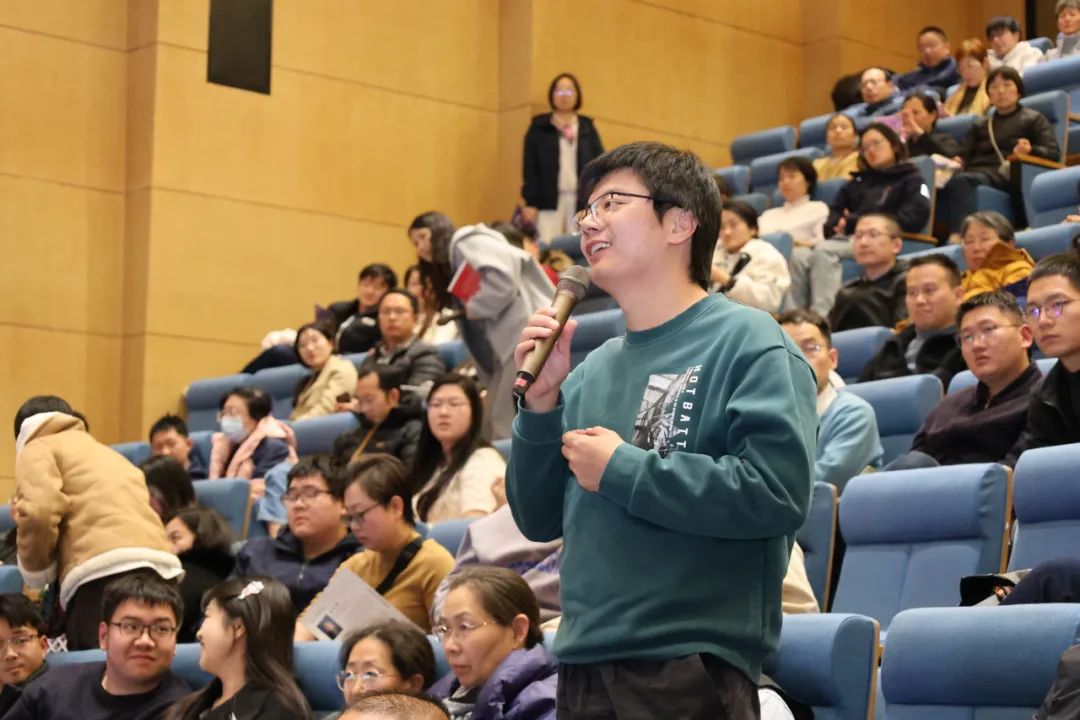
Last night (November 28), the 16th lecture of Peking University Dishui Lake Lecture (PKU-DSLLH) was successfully held. Zhou Feizhou, Professor and Doctoral Supervisor of the Department of Sociology at Peking University, Director of the Department of Sociology, and Director of the Institute of Sociology and Anthropology at Peking University, was invited to give a special lecture entitled
Rites and Chinese Society: Starting from Banquets at the Dishui Lake Theatre.

At the lecture, Prof. Zhou first briefly traced the origins and functions of rites, explaining how rites, initially serving the purpose of "worshipping deities and seeking blessings," gradually evolved into norms, institutions, and laws that shaped traditional Chinese society, ultimately influencing every aspect of human behavior and speech. By sharing a study on rural banquets, he used the context of feasts to cite Fei Xiaotong's famous "ripple effect" metaphor and the concept of the "differential mode of association" to elaborate on the fundamental characteristics of Chinese social structure. He further explained the historical roots of phenomena such as "relationships" (关系) and "human sentiment" (人情) in contemporary Chinese social studies.

Prof. Zhou pointed out that "li" not only serves functions of economic mutual assistance and social integration but also plays a crucial role as an expression of emotions between people in society, thereby fulfilling aspects of social order and values. Human emotions such as joy, anger, sorrow, and happiness originate from human nature, but when expressed, they may deviate towards "excess" or "deficiency." The role of ritual is to restrain excessive sentimentality or stimulate indifferent, enabling emotional expression to reach a state of "appropriate measure," thus aligning with the goodness inherent in human nature. This is called "returning to one's innate goodness". That is, ritual serves to convey emotions and return to one's innate goodness. Expressing emotions within relationships, "becoming a person" through "doing things," acting appropriately—neither excessive nor deficient—is the essence of ritual in personal cultivation.

During the interactive Q&A session, faced with enthusiastic questions from the audience on topics such as "the phenomenon of cutting ties with relatives," "socially anxious individuals," "differences and evolution between rural banquets and urban weddings," and "how to handle social relationships with superiors and friends," Prof. Zhou did not rush to answer. Instead, he shared his insights based on his research and practical experience: most of the mentioned social phenomena stem from modern people feeling isolated and helpless in the face of today's individualized and atomized social development. They find themselves without established norms or clear guidelines for navigating interpersonal relationships in contemporary society, leaving them at a loss. Therefore, discussing "li" (礼) is meaningful. It is not about seeking a single solution, but rather hoping to serve as "turning on a light"—offering some illumination to real-life situations.



Gong Hongbing, Member of the Party Working Committee of Lin-gang Special Area, attended the event and presented the commemorative lecture plaque. Over 300 participants—including representatives from relevant departments of
Lin-gang Special Area Administration,
Peking University Lin-gang International Sci-Tech Innovation Center (PKU-IICSH), Peking University alumni, and registered citizens—joined the event.


Before the lecture, Prof. Zhou conducted an on-site inspection of
PKU-IICSH, visited
the Party-Mass Service Center and
PWA Instrumentation & Service Center for Biomedicine, and offered her kind guidance to the center's development.

Initiated with the support of the China (Shanghai) Pilot Free Trade Zone Lin-gang Speacial Area Administration (hereinafter referred to as Lin-gang Special Area, or LSAA), Peking University Dishui Lake Lecture Hall (PKU-DSLLH) is a collaborative effort involving Peking University International Sci-Tech Innovation Center at Lin-gang Special Area, China (Shanghai) Pilot Free Trade Zone (PKU-IICSH), Peking University Office of Science and Technology Development, and Office of Humanities and Social Science, and enjoying an active participation from Peking University Press, Peking University Alumni Association, and other relevant offices and departments. Leveraging Peking University's profound academic foundation and expert resources in the humanities and social sciences, PKU-DSLLH focuses on key areas including economic development, humanities and arts, and social governance.
Since August 2023, PKU-DSLLH has been hosting monthly lectures featuring renowned professors or expert scholars from Peking University, who provide specialized lectures and engage in in-depth discussions with residents in Lin-gang. This initiative aims to facilitate the concentration of high-quality humanities and social science resources from Peking University in Lingang, effectively enhancing the cultural image and urban competitiveness of the Lin-gang Special Area.


